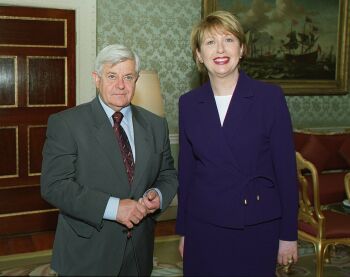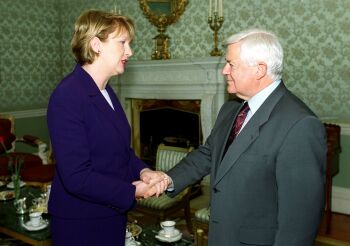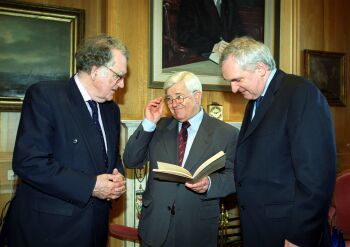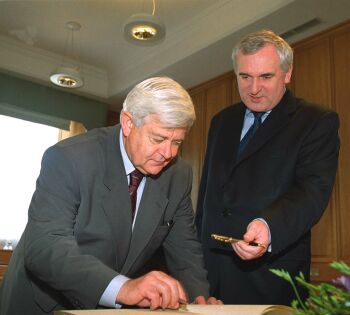|

THE IRISH NATIONAL FORUM ON EUROPE
Address by President Milan Kucan
Dublin (Ireland), 18 June 2002
President,
Members of the Forum,
Excellencies,
Ladies and Gentlemen,
Allow me at the outset to thank you most sincerely for this opportunity afforded to me to address your esteemed Forum. Under the Chairmanship of honourable Senator Hayes the Forum has acquired the reputation of an independent and esteemed democratic body debating the most important aspects of European future. I am glad that you also incorporate representatives of the candidate countries in the forum’s activities, thus allowing you to gain insight into their views of the future of the Union and our common European home.
The point of departure for my remarks today is my conviction that we Europeans are now living very sensitive and decisive moments that will profoundly mark the future face of our continent. For some time now the European body politic has been searching for a realistic idea of how to regulate relations between European countries, nations and citizens. It wants to base its solutions on the democratic values of the European civilisational heritage. It is my firm belief that any consideration of this issue cannot be narrowed down simply to institutional solutions. We need to consider the reality of Europe and of the world. In this context we must consider the role we Europeans would like our continent to play in the world. Both considerations must happen within the Convention on the future of Europe. Its work should incorporate the broadest possible spectrum of the citizenry in all European countries. It is they that will decide on the future solutions and take responsibility for them, in many cases by way of a referendum.
I. European and global issues are closely interconnected. The future of the world is also very much dependent of Europe, its internal integration and its ability to establish itself as a region in this world with an influence and responsibility commensurate with its undisputed economic and political might. That is why the political model for a 21st century Europe is one of the key issues of tomorrow's world as a whole.
Different worlds exist within this global world. The gaps between them are not narrowing, they are growing wider. Europe is but one of its centres. If it wants to make sure it has an influence in this world, if it wants the world to fit its own increasingly universal values and its spiritual heritage, to fit its economic might, cultural influence, social and political stability, then it must ask itself what it must still do in order to be able to play such a role What it must do for Europe to be capable of acting as an effective and influential interlocutor on the crucial issues of the future of mankind, issues concerning the future of life on Earth and the future of our planet.
Europe is divided into several Europes: there is still the political east and west, but there are also already first signs of new divisions into a developed and underdeveloped Europe; a peaceful and stable Europe on the one hand, and an unstable Europe on the other; a Europe uniting within its integration structures, and a Europe still only approaching this goal. It is perfectly cletar that a divided Europe cannot play an influential role in the world.
In order to pursue the desired role in the world it is necessary for Europe to be capable of speaking in one single voice with regard to crucial issues of the world and its future. It must have a common position on these crucial issues, expressing the views and interests of all Europeans. It is necessary for Europe to formulate its structure as a special political entity, an entity representing the common identity of all European states and an entity that will have sufficient space for the expression of the particular identity of every single European state.
If the Convention will honestly map out and recognise the present realistic shape of Europe it will have an easier time coming up with answers for the institutional setup and the institutional relations within this European integration structure and with the Member States. Future forms and relations will thus become an expression of the substance that the members of this integration wish to achieve through unification.
An important if not crucial dimension of the intended institutional changes, debated also by the Convention, is the commensurate distribution of political power between Europe's central institutions and the nation states, between EU member states, as well the adequate representation of Member States in these institutions. A commensurate and fair distribution of power in the emerging new Europe would trigger its creative synergy both in the internal relations among European states and in enforcing Europe's political role in a global world.
The question in the forefront is how to ensure that no Member State would be outvoted when existential interests are at stake. That in turn requires consensus on what those interests are. There are questions that are of crucial importance for the existence and development of the European Union and in which there can be no outvoting, and then there are questions that can be decided by a greater or lesser majority. Certainly, however, the functioning of the European Union must be transparent, understandable to all citizens of the Member States who will at the same time be citizens of the European Union, whose insight and influence must be provided for.
We shall have to explain to the body politic and to the citizens that the European Union is neither about surrendering a part of a nation state's sovereignty to this supranational structure, nor about the transfer of a part of that sovereignty, but instead about the common implementation of a part of the sovereign functions of states. These functions do belong to the states, but these states have recognised and determined those common interests for whose sake they decided to enter the European Union in the first place. By their very nature these interests are such that European countries can only effectively pursue them conjointly. That, however, requires the development and strengthening of other common functions, which they implement jointly at Union level.
II. Slovenia's outlook on the concrete proposals for the institutional restructuring of the European Union voiced to date cannot provide a qualified judgement as to their adequacy in all of their aspects since Slovenia is not yet living all the advantages, the problems and the dilemmas of the Union. This outlook is derived from Slovenia's experience, an experience that is different from that of Ireland. Only in the last century we Slovenes underwent three wars. Today, we are living on the border between stability and instability in Europe, two areas separated by the strict Schengen regime.
The criteria for judging the restructuring ideas and the criteria for events to come following enlargement also stem from Slovenia's geopolitical position. Our Central European historical experience shows that a safe and peaceful life in a region is only possible if that area shares the same values.
Slovenia has similar experiences also from its fifty years of life in the federation of southern Slavs. Slovenia’s experience shows that a federation can only live successfully if the citizens and the nations in the states members of a federation experience the federation as a community that allows them to pursue their common interests better than they could individually. The Yugoslav experience, however, also shows that a federation where the interests of one or several member states are being placed above the interests of others, which flagrantly violates the equality of political entities, has no prospects for the development of its constituent parts, the federation as a whole and, in the final consequence, for democratic relations. Regulating relations in a federation composed of various national entities is even more complex than in a federation that is not multi-national. Even further problems arise if the economic development and social structures of the federal entities exhibit great differences.
In spite of a different vision of the future and guarantees for that future, all values characteristic of highly developed democracies subsided in the Yugoslav federation. The consequences are well known. That common state was undergoing constant institutional reform but it nevertheless fell apart. Why? Because with these reforms the “vessel” of common life was neglected and grew ever emptier. The country ended up without common values and ideas, without a bonding tissue that would integrate the country, it ended up without a “soul”. It lost its raison d’Ítre . Let me particularly emphasise that Yugoslavia did not fall apart because it was a federation or because it was a multi-ethnic structure, but primarily because it was undemocratic and incapable of preserving the equality of its national federal units.
That is the reason why Slovenia is so sensitive as to the issue of values, to the enrichment of the European idea, which must represent the bonding tissue of the European Union and justify its existence. That is also why Slovenia supports the position that the Union or, in time, a united Europe cannot comprise just its institutions and the regulation of relations between those institutions themselves and between the institutions and the Member States. The Europe of the 3 rd millenium must primarily be a community of values developed in the European civilisational heritage and giving rise to the coexistence of differences, legal security, social justice and social cohesion, as well as a commitment to that common European home, all of which would ensure a safe development for all those identities. It must be a community of states and nations desirous of living together for the sake of the values that were so savagely torn apart by the past century’s world wars, totalitarian ideologies and political systems based on them. Slovenia therefore also views the new Europe as a spiritual and cultural undertaking. An undertaking strengthening Europe’s “shared soul”. The Europe of the 21st century is about giving up short-sighted national egotism. It is thus also an ethical project.
III. The European Union is the quintessence of European integration. Also countries that still remain far from EU standards will strive to meet all the requirements for entry into this structure. If delays were to occur, then it could well happen that these countries will start living with a different mentality forced on them by the circumstances. Economically they would not be capable of developing as they could within the EU, consequently they will not be able to develop their social policies, provide social security or social cohesion as well as equal opportunities. The political tensions that will follow will redirect them away from democracy. The dividing lines between several Europes will thus become even more acute than today. A new Europe will become just an illusion, no longer a vision.
The governments of all European states, both EU Member States and candidates, as well as those who are only to begin accession negotiations, bear a great responsibility. They must establish an intensive dialogue with their national publics and inform them convincingly of all the great advantages the enlargement process brings to Europe's citizens, as well as the negative effects that slowing or even abandoning enlargement would have on their lives. It is very important for people to be sufficiently informed, otherwise uncertainty and fear over a decreasing quality of life, of the standard of living, the loss of jobs, of national, cultural and spiritual identity and security would prevail. All of this gives rise to a resistance against enlargement and offers fertile ground to national populism, xenophobia, racism and national egotism.
The political model of a 21st century Europe will certainly have to look at the differences in development between the individual countries. This, however, would not impair the successful functioning of a political model for all of Europe provided common values and common ethical guidelines are reaffirmed, emphasising both competition and cooperation, both individual responsibility and solidarity. This is only possible if equality among all states will be taken sufficiently into account, if states will also be held responsible towards other states for their actions, not just towards themselves, if individual identities will open up to one another faster and if a local, regional, national and a European identity will start developing in the sentiments of belonging among the old continents' population, replacing purely hierarchical identities. That political model would unavoidably also have to contain instruments for releasing and integrating European energies. That model would also have to adjust its institutions and decision-making levels to this objective – solidarity and cohesion. I firmly believe that the principle of solidarity will also have to be implemented for the new EU member States.
Of course, in doing so one should not overlook the great differences in the economic development of candidate countries. These differences exist not only in relation to EU Member States, but also in relations between the candidate countries themselves. The differences between them are greater than the differences between some of the candidate countries and the European Union. I am therefore convinced that the in-principle political decision to admit a larger number of candidates to the European Union will have to take into account the individual features and particularly the level of development and preparedness of the candidates. It seems that an individual treatment of candidates would be the best solution.
I believe that your Irish experience also speaks of this. While respecting your specificities you provided for a very respectable development, making good use of the advantages offered by life in the EU. I should therefore like to believe that at the next referendum your public will agree to the European enlargement process and thus open opportunities also to Slovenia as well as to other candidates for the development that Ireland has already enjoyed.
- * -
In summary, the political model of an enlarged European Union will meet the requirements of a uniting Europe and will be acceptable to all Europeans, to all nations and states in Europe provided it is based on and functions on common ethical foundations and guiding principles, provided it will rise up from the European pluralistic tradition, provided it respects and treats equally all that grows on European soil. The EU’s development to date has shown that things are resolved with the passage of time, as they mature to an extent where the Member States recognise them as solvable in a manner suitable to all. I believe that also in the future it will be more useful to tread the path of gradual adjustment to new circumstances instead of taking the uncertain path of radical change. What has been achieved is too precious to sacrifice it to insufficiently thought-out solutions. If the goals are clear then sooner or later the path becomes clear as well. Thus all us Europeans will have more Europe. And there will be more of an influential and responsible Europe for the world as well.
Slovenia is prepared to become a part of such a Europe, it is prepared to take on its share of the responsibility for that common European home. Thank you for your attention.





|





